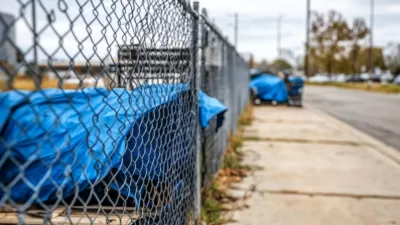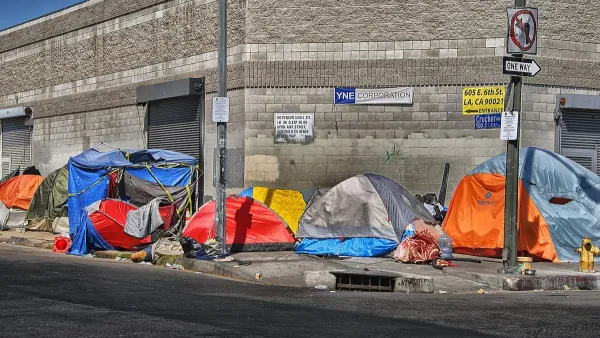Squatting has been a rite of passage for British youth since at least the 1960s, but a new law criminalizing the practice, amid a rise in squatters due to the economic crisis, is "upending the rebellious and politically charged British subculture."
Although squatting has typically been viewed as a political or cultural statement in Britain, the practice has been increasing of late due to economic necessity, reports Anthony Faiola, yet as this need grows, "for the first time since the 1970s, squatters at residential
properties are facing forcible evictions without court orders, as well
as penalties of up $8,000 and six months in jail."
"Like the outright homeless, Britain's squatter population, experts say, is filling up with those who are slipping between the cracks of
the eroding social safety net here, with housing and other benefits for
the poor, for instance, being slashed by the Conservative-led
government in the middle of a recession."
"Conservative legislator Mike Weatherley, who spearheaded the squatter
criminalization law, argues that most squatting is not a question of
economic need," writes Faiola. "He said most squatters are occupying property based on
antisocial political beliefs. Those in real need of economic assistance, he said, should be aided by charities and the government when necessary."
"A
lot of people say that squatting is providing a service, somewhere the
homeless can go for shelter," he said. "But why would you want
vulnerable people to be housed in unsafe and precarious squats? That is
not how a civilized society behaves."
FULL STORY: As squatters rise again, Britain takes aim with new law criminalizing the practice

Maui's Vacation Rental Debate Turns Ugly
Verbal attacks, misinformation campaigns and fistfights plague a high-stakes debate to convert thousands of vacation rentals into long-term housing.

Planetizen Federal Action Tracker
A weekly monitor of how Trump’s orders and actions are impacting planners and planning in America.

In Urban Planning, AI Prompting Could be the New Design Thinking
Creativity has long been key to great urban design. What if we see AI as our new creative partner?

Portland Raises Parking Fees to Pay for Street Maintenance
The city is struggling to bridge a massive budget gap at the Bureau of Transportation, which largely depleted its reserves during the Civd-19 pandemic.

Spokane Mayor Introduces Housing Reforms Package
Mayor Lisa Brown’s proposals include deferring or waiving some development fees to encourage more affordable housing development.

Houston Mayor Kills Another Bike Lane
The mayor rejected a proposed bike lane in the Montrose district in keeping with his pledge to maintain car lanes.
Urban Design for Planners 1: Software Tools
This six-course series explores essential urban design concepts using open source software and equips planners with the tools they need to participate fully in the urban design process.
Planning for Universal Design
Learn the tools for implementing Universal Design in planning regulations.
Gallatin County Department of Planning & Community Development
Heyer Gruel & Associates PA
JM Goldson LLC
City of Camden Redevelopment Agency
City of Astoria
Transportation Research & Education Center (TREC) at Portland State University
Jefferson Parish Government
Camden Redevelopment Agency
City of Claremont





























